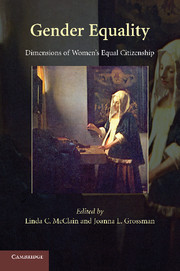Book contents
- Frontmatter
- Contents
- Contributors
- Acknowledgments
- Gender Equality
- Introduction
- PART I CONSTITUTIONAL CITIZENSHIP AND GENDER
- PART II POLITICAL CITIZENSHIP AND GENDER
- PART III SOCIAL CITIZENSHIP AND GENDER
- PART IV SEXUAL AND REPRODUCTIVE CITIZENSHIP
- PART V GLOBAL CITIZENSHIP AND GENDER
- 17 Women's Unequal Citizenship at the Border: Lessons From Three Nonfiction Films About the Women of Juárez
- 18 Domestic Violence, Citizenship, and Equality
- 19 On the Path to Equal Citizenship and Gender Equality: Political, Judicial, and Legal Empowerment of Muslim Women
- 20 Gender and Human Rights: Between Morals and Politics
- Suggested Readings
- Index
- References
19 - On the Path to Equal Citizenship and Gender Equality: Political, Judicial, and Legal Empowerment of Muslim Women
Published online by Cambridge University Press: 05 August 2012
- Frontmatter
- Contents
- Contributors
- Acknowledgments
- Gender Equality
- Introduction
- PART I CONSTITUTIONAL CITIZENSHIP AND GENDER
- PART II POLITICAL CITIZENSHIP AND GENDER
- PART III SOCIAL CITIZENSHIP AND GENDER
- PART IV SEXUAL AND REPRODUCTIVE CITIZENSHIP
- PART V GLOBAL CITIZENSHIP AND GENDER
- 17 Women's Unequal Citizenship at the Border: Lessons From Three Nonfiction Films About the Women of Juárez
- 18 Domestic Violence, Citizenship, and Equality
- 19 On the Path to Equal Citizenship and Gender Equality: Political, Judicial, and Legal Empowerment of Muslim Women
- 20 Gender and Human Rights: Between Morals and Politics
- Suggested Readings
- Index
- References
Summary
Never again will I whisper in the shadows of intimidation. They will kill me but they will not kill my voice, because it will be the voice of all Afghan women. You can cut the flower, but you cannot stop the coming of spring.
Equal citizenship is often declared in the constitutions of Muslim countries, but it is not enforced in practice. Despite formal declarations of gender equality, Muslim women are not yet considered as being equal to men. A male-centered approach to Islam has produced this result. Male clerics issue patriarchal interpretations of Islam, which undermine the formal guarantee of equal citizenship for women. According to some hard-line interpretations of Islamic law, women and men are different in essence and therefore in rights. For example, an interpretation of Islamic law states that the testimony of a woman in court is worth only half that of a man. Interpreters rely on alleged hadiths such as “women are naturally, morally and religiously defective,” despite the existence of verses of the Koran that state equality between men and women. These hard-line interpretations create the perception of women as second-class citizens. Therefore, the first and foremost struggle is to ensure that women are considered equal.
The notion of citizenship in Muslim countries is not necessarily consonant with the liberal approach to citizenship: it is the group, rather than the individual, that matters.
- Type
- Chapter
- Information
- Gender EqualityDimensions of Women's Equal Citizenship, pp. 390 - 408Publisher: Cambridge University PressPrint publication year: 2009
References
- 2
- Cited by



